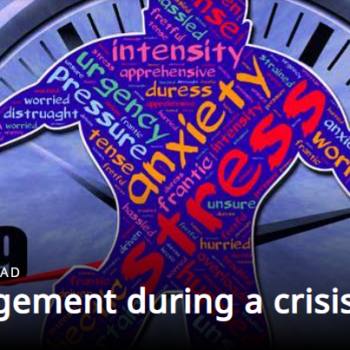Management It’s challenging enough to manage a business at crisis during a the best of times, however management during a crisis is a different ball game altogether, writes MARISA DIMITRIADIS. ow you decide to manage your business during a crisis will determine whether your business will survive it. I would like to share with you 10 H industry and your competitors and if you are not moving in the same direction and are getting left behind, it’s time to pivot so you get back on track. Stock / inventory • consumers like to see anything new that helps them. Support you as a business better – think about which brands or products or service providers stood out during crisis times and supported the industry.
That is areas of management that need to 2 The best time to introduce new who you need to partner with, be looked at carefully that detail brands and stock items is during because it’s not only during some serious changes and decisions a crisis. Look for brands that fit the good times that you need that need to be made during crisis the crisis criteria and which do the your brand partner, but more so times. following: during the tough times. • Boost profit – look specifically
Business plan for higher profit margins. Staff It is critical to review your business • Create curiosity – is there an There are a few areas to focus on 1 plan during a crisis. If you’ve never had a business plan before, now is the time to sit down and write it, and if you do have one, then review it. Look at where you are interesting story behind the brand and products? Do they have a strong social initiative and are they focused on reducing the carbon footprint? 3 when managing staff during a crisis. First of all, understand that YOU are in control of managing the energy transference of your team. It is critical to have a wellness initiative in comparison to the rest of the • Innovate – during a crisis running at all times, even if it is only
a small, simple initiative. Secondly, training is more important than ever on a daily and weekly basis. Daily can take place in the form of a ‘product of the day’ and weekly can be in the form of an SOP (Standard Operational Procedures), but training has to be scheduled in the diary and must happen. Ensure to provide safe feedback channels for your team so that they feel comfortable enough to speak to you and provide information. And lastly, throw out all your old incentive plans because new goals and needs require different incentives to get your team to meet the requirements of the business. Team up with your brand partners and implement an incentive that is going to give you the results you need.
Clients
Call at least one client per day, for every single day. Ask questions, get feedback, ask opinions and find out how they are doing. But this needs to happen with an actual phone call, not a message or email. And this phone call must be from you the owner, or the manager, not the receptionist or therapist.
Prepare
Preparation is vital at any time but five more so during a crisis. Chasing problems and putting out fires is only going to drain your energy. If you are prepared for the day, for the week and for the month and know exactly what you are doing, managing during a crisis can turn into a success story you can tell forever. Time blocking has never been so critical.
Unmet market needs
Ask yourself some very crucial questions.
What market needs did you previously fill that have now gone away?
What are the new market needs that you can fill?
What opportunities are out there now that there is a crisis?
What forced innovations are you going to keep and make part of your business?
What will you eliminate permanently?
These questions are hard to answer but if you give yourself time to sit down and really analyse them, you will discover your pivot and how your business needs to change course to get to the same destination.
Make a noise about your quality and service
Tell clients about the excellent quality of the products you are using on them. Explain to them how you will not cut down on the cost of goods and compromise quality, but rather offer better quality. Tell your clients how you are training your team to upgrade their service delivery skills and ask for their input so they feel they are helping you. This makes clients feel like they are ‘in’ on your business.
Create a ‘change’ story and tell the world
People want to hear stories about how businesses have changed and what they are doing differently to survive the crisis. So find your ‘change’, create a beautiful story and tell the world. For instance, if you have chosen to begin your online journey, are you making a noise about it?
Cut one or two key staff members
This is a tough one but understand that either one or two of your ‘change blockers’ must go, or your whole business will go. It is time to focus on the staff that will do anything, work day and night, that will commit to learning more and delivering better service than ever before. The staff that complain and want more and more but are willing to give less and less, must go.
Don’t be held ransom by staff that you feel you cannot do without.
You can and you will be better off without them in the long run.
During a crisis letting go of staff is the most difficult thing to do because everyone is in need, but you must make careful decisions for the rest of your team and for your entire business.

What actions are you prepared to take right now?
Consider carefully what you will commit to doing from the list above and ask yourself what you are willing to sacrifice to ensure your business survives and is managed correctly. PB
Marisa Dimitriadis is the founder of The Spa Consultants and co-founder of The Spa Professionals Guild, a training network for the industry.
[email protected]
Please Click Here to view original article

